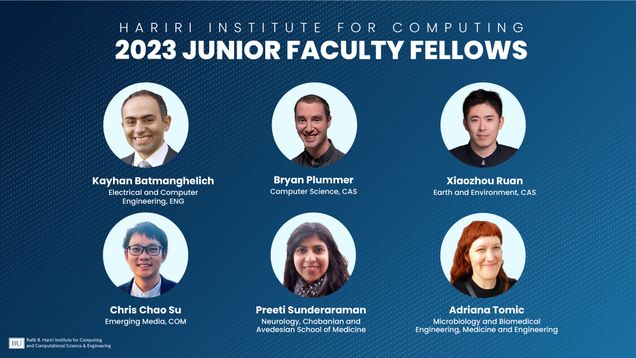2023 Hariri Institute Junior Faculty Fellows and Graduate Student Fellows
Hariri Institute for Computing fellows are competitive awards granted to early-career faculty and exemplary doctoral students who are pursuing innovative computationally-driven research with the potential for high impact.
Our 2023 awarded cohort includes six Junior Faculty Fellows and seven Graduate Student Fellows from a variety of colleges and schools across Boston University. These newly appointed fellows are applying computational methods and tools to advance research in a variety of fields, including astronomy, biostatistics, computer science, earth & environment, engineering, emerging media, genetics and genomics, neurology, psychological sciences and more.
The Institute supports our junior faculty and doctoral student fellows by contributing to their research developments and connecting them with one another to lead Institute-sponsored events. These Hariri Institute FRPs are three-year appointments. Award recipients are selected by the Hariri Institute Steering Committee based on nominations received each spring.
Learn more about our 2023 Junior Faculty Fellows and Graduate Student Fellows below.

2023 Junior Faculty Fellows
Hariri Institute Junior Faculty Fellows program recognizes early-career faculty who are emerging leaders in their field and solving complex research problems through the use of novel computational methods and tools. This fellowship program is designed to advance junior faculty research and create opportunities for collaboration at BU and beyond. Our 2023 Junior Faculty Fellows are:
Kayhan Batmanghelich, Electrical and Computer Engineering, ENG
Dr. Batmanghelich’s research includes developing methods and addressing critical challenges of machine learning to develop trustworthy AI for the healthcare domain.
Bryan Plummer, Computer Science, CAS
Dr. Plummer’s research falls within the umbrella of artificial intelligence with a focus on visual recognition scene understanding, interpretable machine learning, and understanding the relationship between vision and language.
Xiaozhou Ruan, Earth and Environment, CAS
Dr. Ruan’s research develops novel parameterizations of small-scale ocean physics into global climate models. These parameterizations have far-reaching implications for modeling the Earth’s climate system.
Chris Chao Su, Emerging Media Studies, COM
Dr. Su’s work focuses on social media analytics and political communication, with special emphasis on these dynamics in East Asia. His research uses computational methods to explore how media audiences take shape in an increasingly fragmented digital media environment.
Preeti Sunderaraman, Neurology, Chobanian and Avedesian School of Medicine
Dr. Sunderaraman’s research intends to leverage cognitive and functional assessments via state-of-the-art imaging and digital technologies. Using sound integration technologies, her research examines how technology interacts with financial decision making and financial awareness.
Adriana Tomic, Microbiology and Biomedical Engineering, Medicine and Engineering
Dr. Tomic’s research focuses on understanding protective immune responses to viral infections and vaccines, demonstrating the transformative potential of computational perspectives in infectious diseases research.

2023 Graduate Student Fellows
Hariri Institute Graduate Student Fellows program recognizes exemplary doctoral students at Boston University who are engaged in innovative research related to computational science. These fellowships are designed to support and promote student research, and create opportunities for collaboration. Learn more about our 2023 Graduate Student Fellows below.
Courtney Aul, Psychological and Brain Sciences, GRS
With a background in neuroscience, psychology, and cognitive science, Courtney Aul works on projects in the Vision and Cognition lab that focus on non-motor symptoms of Parkinson’s disease. She is developing her own project in the lab based on her background in visual sustained attention.
Margaret (Greta) Rauch, History, CAS
Greta Rauch’s work combines Chinese, literature, religion, and technology to research the impact of belief systems on the development of literary and intellectual history. Her computational and data-driven research examines how the history of the shift to vernacular writing.
Edward Ruiz, Genetics and Genomics, Chobanian and Avedesian School of Medicine
With a background in interdisciplinary research, Edward Ruiz studies tissue and cancer biology in new ways that span multiple fields. Ruiz is passionate about helping graduate students learn about diverse computational methods and promoting interdisciplinary collaboration.
Jack Vincent, Biomedical Engineering, ENG
Jack Vincent’s work examines how high-level motor centers in the mammalian brain shape the output of low-level pattern generating circuits in the brainstem. This project tests hypotheses developed through a synthesis of machine learning, control theoretic, and biophysical modeling.
Connor Wagaman, Computer Science, CAS
Connor Wagaman’s research works to estimate basic network statistics on a sensitive data set when the data arrives one at a time and the statistics fluctuate as the network evolves. He also works on projects that aim to develop new algorithms and methodology for the private analysis of social network data.
Yixin (Amy) Zhang, Biostatistics, CAS
Amy Zhang is interested in utilizing her public health background to explore social causes, such as disparities in healthcare. Zhang utilizes her statistical background and computational skills while working with physicians of different specialties and computational biologists.
Zeying Zhu, Electrical and Computer Engineering, ENG
Zeying Zhu currently works to design effective software-based telemetry solutions for high-volume network traffic in software network functions and microservices. Previously, Zhu designed and implemented a distributed analytics system that analyzes graph-structured data.
The mission of the Hariri Institute’s Focused Research Programs (FRPs) is to evolve and advance Boston University’s research in computing and data science around areas of strategic importance and emerging opportunity. The programs are designed to facilitate research convergence by providing ‘scaffolding’ for groups to coalesce in sustainable ways, with the goal of accelerating research for future funding and broader impact. Learn more about Hariri Institute Fellows programs here.